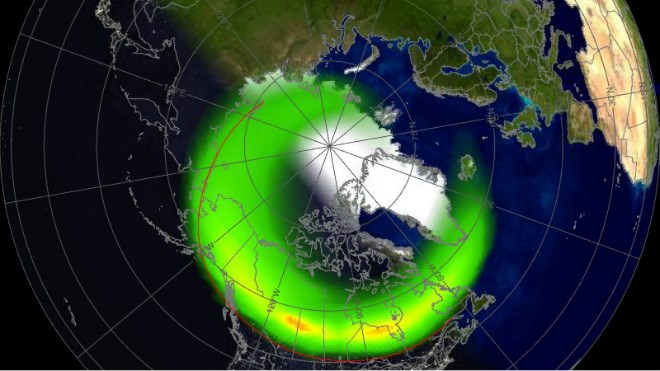They won't be easy to spot, but tonight is the best chance for local stargazers to get a look at that natural wonder known as Aurora Borealis.
Scott Sutherland, meteorologist and science writer for the Weather Network, said the Northern Lights should be visible tonight for sharp-eyed skygazers, and again on the weekend.
"People have reported seeing them as far away as Kingston," Sutherland said. "They used their camera over a long exposure time. And they were able to pick out some things with their eyes but it was difficult."
The Northern Lights occur when charged particles from the sun are blown toward Earth by solar wind. The Earth's magnetic field protects us from harm, but it's weakest at both the North and South poles. The lights are created when the particles from the sun hit us at the poles and collide with gases in our atmosphere.
The current surge in particles from the sun blown toward the Earth was forecast by the U.S. National Oceanic and Atmospheric Administration, which does a sort of weather forecast for space.
Sutherland said tonight's clear skies, as well as clear skies forecast for Saturday and Sunday, offer Sudburians the best chance to see the natural phenomena.
The current stream of particles coming from the sun is expected to clear by next week.
"But we're not quite sure how strong it's going to be," Sutherland said."It seems to be tapering off. It was really strong Monday morning, when we were just entering the region of solar wind.
"You being north of the Great Lakes, you're going to have one of the best chances of seeing something there. It's just a matter of when it shows up and how strong it's going to be."
There are a number of steps stargazers can take to improve their chances of seeing the dancing green lights in this area. First, drive somewhere that's reasonably far from city lights.
"Head to a wilderness area near the city, and look north," he said. "Just give your eyes enough time to adjust to the darkness -- maybe half an hour – and stay off your cellphones because that will spoil your night vision. And just sit back and take it in."
The show will likely peak between 9 p.m. and midnight before tapering off, he said.
"If you have a camera capable of long-exposure imagery -- open the shutter for 15 seconds or so -- that's even better,” Sutherland said. “Then you can set it up, point it north and take pictures. The camera will pick up a lot more than our eyes will."
And up-to-date space weather forecast for the Aurora Borealis can be found here.
